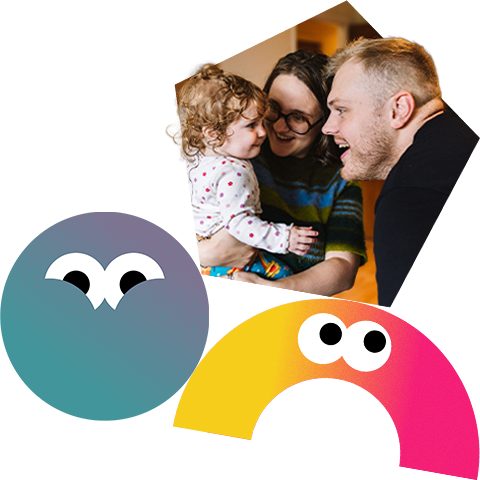Pathway for parents or carers of babies from newborn
Join our learning pathway for all parents, carers and grandparents of young babies: a journey of understanding emotional health, wellbeing, behaviour, and much, more for raising confident, kind, emotionally aware and resilient people.
Pathway stages
Bitesize stages for daily steps towards confident parenting and connected relationships.
1. Understanding feelings: Both your own and your baby’s
1.1 Welcome
1.2 This course
1.3 The hospital
1.4 A few questions
1.5 National resources for you
1.6 Local resources for you
1.7 What’s next
2. Understanding your baby’s brain
2.1 Introduction and Home Activity
2.2 Baby brain development
2.3 You and your baby’s brain
3. Understanding your baby’s crying
3.1 Introduction
3.2 What do babies communicate?
3.3 How do babies communicate?
3.4 Views on crying
3.5 Is it true? You can spoil a baby by picking him up too much when he cries?
3.6 Is it True? Babies need to cry as it’s good for their lungs
3.7 Is it True? Leaving a baby to cry will teach them to comfort themselves
3.8 Is it True? You should never leave a baby to cry
3.9 Is it True? Parents are biologically designed to want to respond to their baby’s cries
3.10 Is it True? Crying is an instinct; a baby hopes someone will respond to them
3.11 Recap and Home activity
4. How to respond to crying
4.1 Introduction and Home Activity
4.2 Responding to crying
4.3 Dealing with not knowing
4.4 Why some babies cry more than others
4.5 Crying due to pain such as colic, reflux or birth trauma
4.6 What might affect how a parent responds to crying?
4.7 Why does how a parent feel affect their response to crying?
4.8 Recap and Home Activity
5. Understanding your baby’s rhythms
5.1 Introduction and Home Activity
5.2 Getting to know your baby’s rhythms
5.3 Introducing the dance of reciprocity
5.4 The Dance of Reciprocity
5.5 Video of the Dance of Reciprocity
5.6 Rupture and repair
5.7 Home Activity: Observe the ‘dance of reciprocity’
6. Developing healthy sleep patterns
6.1 Introduction and Home Activity
6.2 Helping babies to develop healthy sleep patterns
6.3 Why is sleep important for a baby?
6.4 How long should a baby sleep?
6.5 What helps you get to sleep?
6.6 What helps your baby get to sleep?
6.7 Where should babies sleep?
6.8 Crying and sleep
6.9 Home Activity: One new thing and Recap Quiz
7. Understanding your baby’s feeding
7.1 Introduction and Home Activity
7.2 Your baby’s feeding pattern and cues
7.3 How is your baby’s feeding pattern changing?
7.4 Mealtime memories
7.5 Current advice about introducing your baby to solid foods
7.6 Changes in advice over time
7.7 More information about introducing solid foods
7.8 Preparing to introduce solid foods
7.9 Home activity: Something that’s new in your baby’s development
8. Who’s the Daddy now? – I’m the Daddy
8.1 Welcome!
8.2 Father’s time with baby
8.3 The importance of dads
8.4 Understanding your feelings after the birth
8.5 Fathers and breastfeeding
8.6 Breastfeeding – coping with other peoples’ opinions
8.7 Getting used to the change
8.8 Who wants to play?!
8.9 Home activity and end of Module Quiz
9. Understanding your baby’s development and play
9.1 Introduction and Home Activity
9.2 Emotional and physical development
9.3 Emotional development
9.4 The first three months
9.5 Three to nine months
9.6 Nine to twelve months
9.7 Supporting your baby’s emotional and physical milestones
9.8 Play
9.9 Home activity: Playing with your baby
10. Understanding your baby’s childcare
10.1 Introduction
10.2 Feedback from the home activity: playing with your baby
10.3 Other people looking after your baby
10.4 Choosing childcare: Nurseries
10.5 Choosing childcare: Childminders
10.6 Choosing childcare: Family and friends
10.7 End of Module quiz
11. Congratulations
11.1 Congratulations! And Recap Quiz
11.2 A few questions again
11.3 Acknowledgements and references
About this pathway
The important relationships in your baby’s life help shape their emotional health and wellbeing from even before birth. Along this pathway you will learn about early years development and emotional processing while being supported to reflect on your own baby’s health and wellbeing, their behaviour and your relationship.
Our clinical child psychologists, psychotherapists and health practitioners will introduce you to ideas and techniques for nurturing wellbeing and you’ll hear about other parent’s experiences. You will also learn about how these ideas can be helpful for common areas of difficulty such as emotional ‘tantrums’, sleep, toileting and separation.
Parents who have completed the pathway have shared that they feel more confident about their parenting, are more connected with their babies and even feel less anxious.
This online learning pathway was reviewed by an independent research project in 2023 which highlighted a significant improvement in parent’s self-belief after learning online. Published in the Community Practitioner the report highlight improvement in confidence across various aspects of parenting, such as feeding, soothing, establishing routines, and understanding their baby’s needs.

